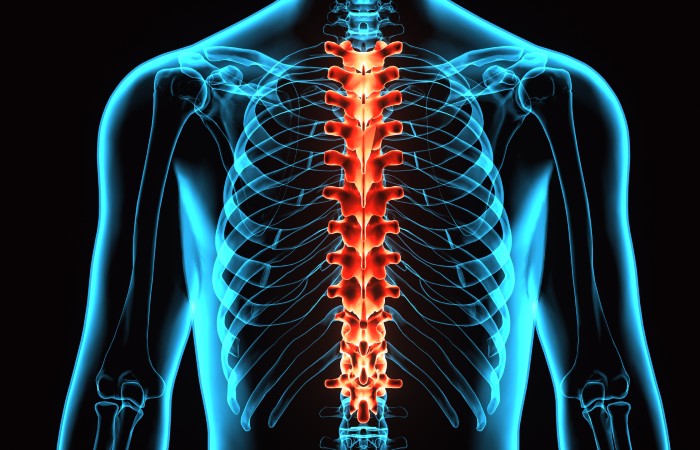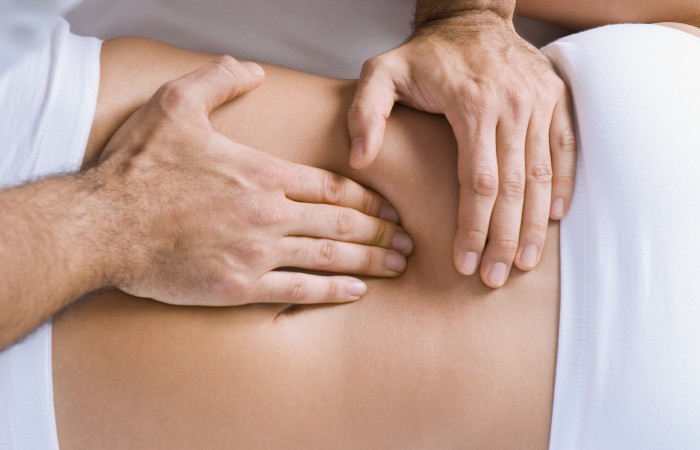 |
| Spinal Cord Injury |
 |
|

By - Abhishek Kaushik
Functional Manual Therapist at VARDĀN
|
|
A spinal cord injury (SCI) is damage to the spinal cord that causes temporary or permanent changes in its function.
Injury can occur at any level of the spinal cord and can be a complete injury, with a total loss of sensation and muscle function, or incomplete, meaning some nervous signals are able to travel past the injured area of the cord.
In the majority of cases, the damage results from physical trauma, such as car accidents, gunshot wounds,
falls, or sports injuries, but it can also result from non-traumatic causes, such as infection, insufficient blood flow, and tumors.
|
|
|
| SIGNS |
|
- A section of skin innervated through a specific part of the spine is called a dermatome, and injury to that part of the spine can cause pain, numbness,
or a loss of sensation in the related areas. Paraesthesia, a tingling or burning sensation in affected areas of the skin, is another symptom.
- A group of muscles innervated through a specific part of the spine is called a myotome,
and injury to that part of the spinal cord, can cause problems with movements that involve those muscles.
|
|
|
| Symptoms |
|
- Muscular: Muscle weakness, problems with coordination, stiff muscles, muscle spasms, or overactive reflexes
- Whole body: Vertigo, palpitation or sweating (autonomic function)
- Sensory: Reduced sensation of touch or pins and needles
- Urinary: Leaking of urine or urinary retention. Bowel and bladder dysfunction can occur at any level.
- Respiratory: Abnormal and painful sensation, or shortness of breath
|
|
|
| Rehabilitation |
|
- Weakness of respiratory muscles impairs the ability to cough effectively, allowing secretions to accumulate within the lungs.
As SCI patients suffer from reduced total lung capacity, tidal volume techniques used to manage respiratory dysfunction include diaphragmatic breathing,
respiratory muscle pacing, use of a constricting abdominal binder, ventilator-assisted speech, and mechanical ventilation.
- Physical therapists focus on the patient's respiratory status, prevention of indirect complications (such as pressure ulcers), maintaining range of motion, and keeping available musculature active. Strengthening and stretching exercises led to improvements in strength and motor functions in patients.
- People with SCI may need to use specialized devices and to make modifications to their environment, in order to handle activities of daily living and to function independently. Weak joints can be stabilized with devices, such as ankle-foot orthoses (AFOs) or knee-AFOs.
- The PNF concept is an approach to neurological rehabilitation that is applied in patient assessment and treatment. This is done through specific patient-handling skills to guide patients through initiation and completion of intended tasks.
|
|
|
| How FMTTM Helps |
 |
|
|
Functional manual therapy® plays an essential role in rehabilitation of patients suffering from spinal cord injury.
When a person comes for an initial evaluation, the motor, sensory, cognition, gait, balance, coordination, reflexes as well as the
strength and range of motion of upper and lower extremity are tested. A FMTTM therapist caters to the mechanical, neuromuscular and motor control
issues faced by the patient which occurs in activities of daily living. PNF or proprioceptive neuromuscular facilitation is
a set of techniques commonly used in clinical environments to enhance both active and passive range of motion in order to
improve motor performance.
|
|
|
 |
| |
Our Client Speak
I have done my course in actuarial sciences. I was on my way for a vacation in Kerala when I had an accident with another car
going 55 miles per hour due to which the side door got opened and I went down to hit the concrete. During the ambulance ride,
I realized that I couldn’t feel my feet and legs. I had suffered a complete injury to the eighth thoracic section of spine,
leaving me a paraplegic unable to regain feeling in limbs.
Meanwhile, the driver walked away without any injury whatsoever.
I was taken to the hospital in Kerala where I rehabilitated for 4 weeks and came back to Delhi.
Over the years, I have had several therapists coming to my house as well as I went to various clinics and hospitals in Delhi.
I came to VARDĀN about 4 years ago with spinal cord injury. With several months of therapy,
I have become better in respect to my back, rib and shoulder pain.
I have become functionally better in terms of sitting, assuming quadruped position.
I have got better strength and endurance in my trunk from proprioceptive neuromuscular facilitation (PNF). I came to VARDĀN and have been having therapy with Abhishek.
With Abhishek’s dedication & hard work, I have got better & will improve more in the future.
- Adeep Jain
|
|
|
 |
 |
| |
|
FOR MORE INFORMATION
Please call 011-43580720-22, 8:30 AM to 6:30 PM
Monday to Saturday
You may also contact our team on
+91-9971112446, +91-9910955500, +91-9810306730, +91-9910855500
Email: vardan@timesgroup.com | Web: www.vardan.in
Address: 16-A, Ring Road, Lajpat Nagar- IV, New Delhi 110024
A Functional Manual Therapist is also available in Gurugram & Noida
|
|
 |
|
|
|







